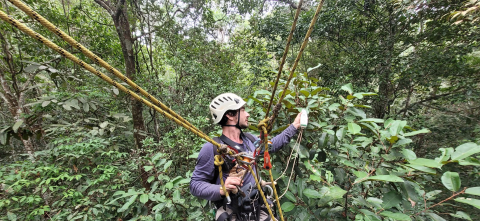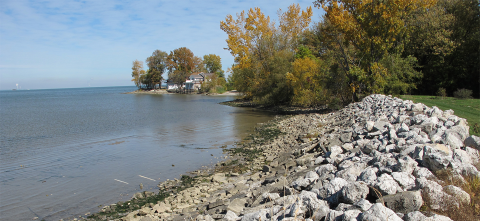
Leaders and Partners Gather on Mackinac to Shape Innovation’s Future
Each year, Michigan’s top leaders gather on Mackinac Island for the Detroit Regional Chamber’s Policy Conference to address key issues shaping the state’s future. This year, Michigan State University hosted a panel highlighting how federal research funding fuels breakthroughs, from improving pancreatic cancer survival rates to addressing crises like the Flint Water Crisis.

May Research at MSU
May is a time of celebration and reflection at MSU. As graduation season ends, we honor students’ achievements and recognize women in leadership. From inspiring faculty to student voices and cultural legacies, these stories reflect the resilience and creativity of the Spartan community.

Amazon Trees Under Stress: New Research Uncovers How Forest Giants Respond to Light and Heat
The study, led by doctoral candidate Leonardo Ziccardi with professor Scott C Stark in the MSU Department of Forestry, shows how tropical trees act like giant solar antennas—absorbing vast quantities of light energy that must be carefully managed.

Too Much of a Good Thing: Consequences of Overplanting Bt Corn in the US
A new study from Michigan State University shows that planting too much genetically modified corn designed to fight off a tough insect — the corn rootworm — especially in the eastern U.S. Corn Belt states may be causing more harm than good.

ROSE Program Cuts Rates of Postpartum Depression in Half While Saving Money
Nearly 1 in 8 women in the U.S. experience postpartum depression (PPD), which is linked to higher rates of substance abuse, domestic violence, infant mortality, and even suicide. Research shows PPD can be reduced by 50% cost-effectively, but looming NIH funding cuts threaten this progress.

MSU Researcher Joins Agricultural Resiliency Program to Boost Michigan’s Water Quality
Michigan’s proximity to the Great Lakes provides access to roughly 20% of the world’s surface fresh water. From agriculture to tourism, water is a key driver of the state’s economy and the well-being of its residents. It has prompted Michigan State University, alongside statewide partners, to invest in bringing some of the leading water researchers to Michigan.

MSU Scholars to Improve Workplace Disability Inclusion Through $2M Grant
Scholars from three MSU colleges are leading a four-year, $2 million NSF-funded grant to enhance workforce inclusion for people with disabilities by researching ways to augment human abilities and redesign workflows.

MSU Researcher Seeking to Improve Treatments for Autoimmune Diseases
According to the American Autoimmune Related Diseases Association, as many as 50 million Americans may be living with an autoimmune disorder. Many of these remain undiagnosed and, without intervention, can worsen over time. Given current treatment options, however, even those being actively managed can be met with complications.
Announcements
